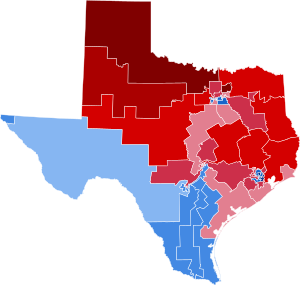United States House of Representatives elections in Texas, 2012
|
|
||||||||||||||||||||||||||||
|---|---|---|---|---|---|---|---|---|---|---|---|---|---|---|---|---|---|---|---|---|---|---|---|---|---|---|---|---|
|
||||||||||||||||||||||||||||
|
All 36 Texas seats to the United States House of Representatives |
||||||||||||||||||||||||||||
| Turnout | 7,993,851 - 58% | |||||||||||||||||||||||||||
|
||||||||||||||||||||||||||||

|
||||||||||||||||||||||||||||
The 2012 United States House of Representatives elections in Texas were held on Tuesday, November 6, 2012 to elect the 36 U.S. Representatives from the state of Texas—an increase of four seats in reapportionment following the 2010 United States Census. The elections coincided with the elections of other federal and state offices, including a quadrennial presidential election and an election for the U.S. Senate. The primary election had been scheduled to be held on March 6, 2012, with a runoff election on May 22; because of problems arising from redistricting, the primary was postponed to May 29, and the run-off to July 31.
With 58% of voting age people turning out, all existing seats were held by their respective parties. Of the four new seats, one was won by the Republican Party for a total of 24 seats, and three were won by the Democratic Party for a total of 12 seats.
In March 2011, The Texas Tribune conducted a poll of Texas "insiders" which found 54 per cent to believe three of the state's four new congressional districts would be drawn to favor the Republican Party, with one district drawn to favor the Democratic Party; while 37 per cent of those polled felt two districts would favor Republicans while two would favor Democrats. In April, Republican U.S. Representative Lamar Smith argued that the seats should be evenly split between the parties in order to reflect Texas's growing Hispanic population and abide by the Voting Rights Act. Joe Barton, also a Republican U.S. Representative, disagreed, arguing that three or four of the districts should favor Republicans.
...
Wikipedia
